Master Class
In Morning, Noon, and Night, Arnold Weinstein writes a moving testament to the persistent power of literature
Book lovers—teachers, readers, and writers (always writers)—are categorically certain of the novel’s necessity. We react with gloom and horror to any suggestion that our beloved books are doomed to disappear from the shelves of warm, coffee-scented shops and sprawling libraries, or that they will then inevitably pass from e-book ether into obsolescence. We groan at the endless encounters with people who are tapping away at text messages or, earbuds in, aloof to the world, plugged into the latest gadget, watching yet another YouTube clip of leprechauns in Alabama or blissed-out hippies gawking at double rainbows or the latest parody of that awful “Friday” song. We think to ourselves, wouldn’t the world be better off if they (and we) were reading?
We may not be able to articulate to ourselves, or to anyone else, exactly why we are so certain of the novel’s enduring value, but our moment in history seems to cry out for a spirited defense of literature. We need a champion, someone who can translate the lessons of literature accessibly, ardently, compassionately, in a voice that invites rather than chastens. Enter Memphis native Arnold Weinstein, lauded professor of comparative literature at Brown University, who, in Morning, Noon, and Night, provides a lucid and provocative formula for drawing useful, universal truths out of a pantheon of great books.
 Library shelves are heavy with testimonials to the value of literature: more recently, Harold Bloom’s The Western Canon and How to Read and Why, or, for the previous generation, the works of Northrop Frye or Charles Van Doren, to name only a few. Morning, Noon, and Night deviates from the formula chiefly by steering away from pedagogical sermons and, instead, inviting its readers to examine themselves through life’s stages—growing up and growing old; innocence and experience; love and death—with a verve and generosity atypical of literary criticism. In fact, it’s almost unfair to call Morning, Noon, and Night a work of criticism; it stands more as an act of interpretive advocacy. Forty years of teaching undergraduates has not drained Arnold Weinstein of love for his work, nor of passion and commitment to both the books he loves and to the students he hopes will be moved and edified by them. Reading Weinstein’s delicate, thoughtful prose inevitably calls to mind that distant AP English class or undergraduate seminar where a patient, practiced, bighearted, and wise teacher guided the earnest and engaged through memorable moments of insight and discovery.
Library shelves are heavy with testimonials to the value of literature: more recently, Harold Bloom’s The Western Canon and How to Read and Why, or, for the previous generation, the works of Northrop Frye or Charles Van Doren, to name only a few. Morning, Noon, and Night deviates from the formula chiefly by steering away from pedagogical sermons and, instead, inviting its readers to examine themselves through life’s stages—growing up and growing old; innocence and experience; love and death—with a verve and generosity atypical of literary criticism. In fact, it’s almost unfair to call Morning, Noon, and Night a work of criticism; it stands more as an act of interpretive advocacy. Forty years of teaching undergraduates has not drained Arnold Weinstein of love for his work, nor of passion and commitment to both the books he loves and to the students he hopes will be moved and edified by them. Reading Weinstein’s delicate, thoughtful prose inevitably calls to mind that distant AP English class or undergraduate seminar where a patient, practiced, bighearted, and wise teacher guided the earnest and engaged through memorable moments of insight and discovery.
Here are many of the old names—Pip and Huck; Quentin Compson and Willy Loman; Catherine Earnshaw and Jane Eyre; Lear and Othello—along with an array of less familiar characters and texts, ranging from the early picaresque Lazarillo de Tormes and the nihilistic Les Liaisons Dangereuses to Jonathan Safran Foer’s post-9/11 novel Extremely Loud and Incredibly Close and the graphic novels Persepolis by Marjane Satrapi and Maus by Art Spiegelman. Weinstein’s efforts to illuminate the thematic synchronicity of these various and diverse texts are not unprecedented. But his deeply personal, pensive, and curious approach enlivens each sentence, making even the most ancient and ubiquitous texts burst with new life and relevance.
Given the breadth and variety of the works Weinstein parses, Morning, Noon, and Night is a demanding read, but its arguments are also easily discernable. Writing about the undoing of Max Van Sydow’s character in Ingmar Bergman’s The Wild Strawberries, Weinstein makes a provocative assertion that might be read as the guiding principle of Morning, Noon, and Night: “All our advanced degrees, along with our material accomplishments, don’t mean zip when it comes to the essentials: Have you lived? Have you loved? If not, why? Why indeed?” The question that naturally follows is, of course, How do we know if we have lived and loved—or, more specifically, if we have lived and loved well? For Weinstein, of course, the answer comes through a reflection on narrative. “Here is the most pragmatic reason we consult literature: as a way of adding to our tool kit, as that special mirror that shows us both how others have come through and how we might learn from them.” One would be hard pressed to find a more approachable and thought-provoking celebration of the manner in which such a broad range of works draw upon the same sources of light.


